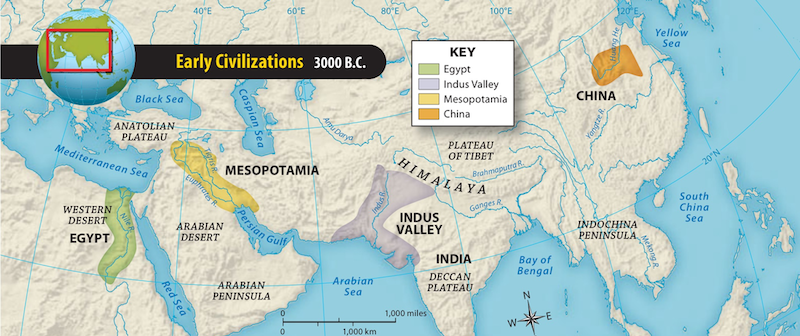The Origins of Civilization
Episode #6 of the course Human history and the first civilizations by Brian Fagan
Hello!
Today, we’ll talk about the origins of civilization.
In about 3100 BC, the first civilizations, commonly called state-organized societies by archeologists, appeared in Egypt and Mesopotamia. The development of the first pre-industrial states was a complex process that took many centuries.
What Is a State-Organized Society?
We archeologists use the term “state-organized society” as shorthand for urbanized, pre-industrial societies. Pre-industrial civilizations like these relied not on fossil fuels like we do, but on the manual labor of thousands of people.
Pre-industrial states are societies based on cities, arbitrarily defined as having more than 5,000 people, many more than in the village. Rulers of such states presided over complex societies, with nobles, numerous officials, and commoners. State economies were based on taxation and tribute, by trading activity monopolized by the state.
This type of economy allowed the support of thousands of non-farmers, as well as priests and artisans.
The rulers of pre-industrial states were often considered to be divine leaders, presiding over an all-embracing state religion. They built impressive public buildings and monumental architecture, like the Egyptian pyramids of Giza and the Mayan temples in Central America. All had some form of recording system, ranging from Egyptian hieroglyphs to the knotted strings used by the Inca of the Andes in South America.
How and Why Did Pre-industrial Civilizations Begin?
Originally, everyone assumed that civilization had originated in Egypt’s Nile Valley. By the 1930s, scholars thought in terms of an “Urban Revolution,” which saw the development of metalworking, intensive trade, and societies with social classes. Today, we know that this is too simple an explanation. But three elements from the Revolution remain of central importance.

Early civilizations.
Civilizations came into being as the result of acquiring large food surpluses from more efficient agriculture required by rising population densities. Diversified, large scale farming of cereal crops like wheat or barley, combined with large herds of cattle and other animals, was a major player. So was irrigation agriculture, which provided critical water to farming communities in Mesopotamia, the Nile Valley, and China, to mention only a few.
Intensified long-distance trade under centralized control brought new ideas, basic commodities, and exotic materials like copper from long distances away. Such trade established important political—and sometimes, ritual—ties between distant communities. Some of this was in the form of exchanges of gifts, as was commonplace in tropical Africa and the Southwest Pacific. Egyptian pharaohs depended heavily on gift exchanges with other rulers. Warfare was unimportant until monarchs with absolute authority, like Assyrian kings, came into power.
Power in Three Domains
The management of a state is a far more complex undertaking than that of a farming village. More than a century after research began, many authorities believe that religion and control of information were major players. There were three centers of power: economic, social and ideological, and political.
Economic power meant having the ability to organize intensive food production, as well as storage and distribution. In time, relationships of dependency developed between producers and those who acquired the product (be it food or other commodities) and those who controlled and distributed it. Once kin-based, pre-industrial civilizations were organized into rulers and the elite, managers (government officials, priests, artisans), and commoners. They were highly centralized structures whose power depended on food surpluses, as well as control of trade.
Social power came from ideological power, creating symbols of cultural and political identity common to everyone. Great public ceremonies and private ones reinforced this ideology, which was also expressed in great temples and the inscriptions on them. Those who were guardians of the ideology were revered because of their apparent supernatural powers, which gave them social superiority over others.
Political power came from a ruler’s ability to impose their authority on society by either administrative means or by force. Political power came not from kin ties, but from foreign relations and defense, as well as from making war and resolving major disputes within society.
History is made by individuals of exceptional ability and leadership qualities. In early states, they were members of an elite and became strong and able leaders—by force, if necessary. These shadowy rulers brought the world’s first states into being.
With these preliminaries in mind, we’ll explore these societies, starting tomorrow with Ancient Egypt and Mesopotamia.
Recommended book
Ancient Civilizations by Chris Scarre and Brian Fagan
Share with friends
